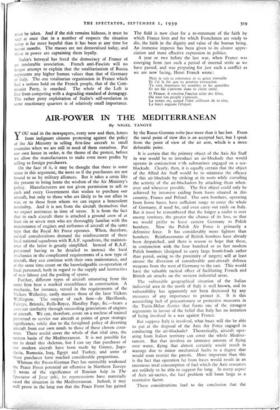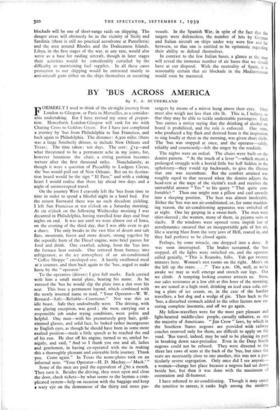AIR-POWER IN THE MEDITERRANEAN
By NIGEL TANGYE
YOU read in the newspapers, every now and then, letters from indignant dti7Pns protesting against the policy of the Air Ministry in selling first-line aircraft to small countries when we are still in need of them ourselves. Put our own house in order, is the theme of the protest, before we allow the manufacturers to make even more profits by selling to foreign purchasers.
On the face of it, it may be thought that there is some sense in this argument, the more so if the purchasers are not bound to us by military alliances. But it takes a crisis like the present to bring home the wisdom of the Air Ministry's policy. Manufacturers are not given permission to sell to each and every Government that wishes to purchase our aircraft, but only to those who are likely to be our allies in war, or to those from whom we can expect a benevolent neutrality. And it is not from the aircraft themselves that we expect assistance in time of stress. It is from the fact that to each aircraft there is attached a ground crew of at least six or seven men who are thoroughly familiar with the maintenance of engines and airframes of aircraft of the same type that the Royal Air Force operates. When, therefore, tactical considerations demand the reinforcement of these local national squadrons with R.A.F. squadrons, the mainten- ance of the latter is greatly simplified. Instead of R.A.F. personnel having to be detailed to instruct the local mechanics in the complicated requirements of a new type of aircraft, they can continue with their own maintenance, and at the same time count on the knowledgeable co-operation of local personnel, both in regard to the supply and instruction of new labour and the pooling of spares.
Further, different types of aircraft emanating from the same firm bear a marked resemblance in construction. A mechanic, for instance, versed in the requirements of the Vickers Wellesley, easily masters those of the later Vickers Wellington. The output of each firm—de Havillands, Faireys, Bristols, Rolls-Royce, Handley Page, &c.—bears a constant similarity through succeeding generations of engines or aircraft. We can, therefore, count on a nucleus of trained personnel to service our aircraft at points of great strategic significance, solely due to the farsighted policy of diverting aircraft from our own needs to those of these chosen coun- tries. These nuclei cover the whole of that vital area, the eastern basin of the Mediterranean. It is not possible for me to detail this skeleton, but I can say that purchases of our modern aircraft have been made by Greece, Jugo- slavia, Rumania, Iraq, Egypt and Turkey, and some of these purchases have reached considerable proportions. Whereas the Russo-German Pact has ostensibly weakened the Peace Front potential air offensive in Northern Europe (I wrote of the significance of Russian help in The Spectator of June 9th), its repercussions have materially eased the situation in the Mediterranean. Indeed, it may well prove in the long run that the Peace Front has gained by the Russo-German volte-face more than it has lost. From the naval point of view this is an accepted fact, but I speak from the point of view of the air arm, which is a more debatable point.
It is certain that the primary object of the Axis Air Staff in war would be to introduce an air-blockade that would operate in conjunction with submarines engaged on a sea- blockade. Clearly, then, it is equally certain that the object of the Allied Air Staff would be to minimise the efficacy of this air-blockade by striking at its roots while curtailing the activity of the air-blockaders by attacking them when- ever and wherever possible. The first object could only be achieved by intensive raiding from bases situated in this country, France and Poland. Our own bombers, operating from home bases, have sufficient range to cover the whole of Germany, if need be, and even carry out raids on Italy. But it must be remembered that the longer a raider is over enemy territory, the greater the chance of its loss, so that we would prefer to leave eastern Germany to Polish bombers. Now the Polish Air Force is primarily a defensive force. It has considerably more fighters than bombers. Reinforcements of British bombers have already been despatched, and there is reason to hope that these, in conjunction with the four hundred or so fast modern Polish bombers (designed to carry large bomb-loads rather than petrol, owing to the proximity of targets) will at least ensure the diversion of considerable anti-aircraft defence weapons from the west of Germany to the east. This would have the valuable tactical effect of facilitating French and British air attacks on the western industrial areas.
The vulnerable geographical situation of the Italian industrial area in the north of Italy is well known, and its vulnerability has apparently not been decreased by any measures of any importance to protect it. It is this astonishing lack of precautionary or protective measures in the Turin-Milan district that forms one of the strongest arguments in favour of the belief that Italy has no intention of being involved in a war against France.
But suppose Italy is involved, what bases will she be able to put at the disposal of the Axis Air Force engaged in conducting the air-blockade? Theoretically, aircraft oper- ating from Italian territory can cover the whole Mediter- ranean. But that involves an immense amount of flying over water, flying that almost certainly would result in wastage due to minor mechanical faults to a degree that would soon restrict the patrols. More important than this is the fact that operation far from bases would result in an enormous total consumption of fuel which the Axis resources are unlikely to be able to support for long. In every aspect of Axis air-tactics, the fuel problem will loom large as a restrictive factor.
These considerations lead to the conclusion that the blockade will be one of short-range raids on shipping. The danger areas will obviously be in the vicinity of Sicily and Sardinia (there is still no practical aerodrome at Pantelleria) and the area around Rhodes and the Dodecanese Islands. Libya, in the first stages of the war, at any rate, would also serve as a base for raiding aircraft, though in later stages their activities would be considerably curtailed by the difficulty in maintaining fuel supplies. In all these cases protection to our shipping would be entrusted mainly to anti-aircraft guns either on the ships themselves or escorting vessels. In the Spanish War, in spite of the fact that the targets were defenceless, the number of hits by German and Italian aircraft on ships under way were few and far between, so that one is entitled to be optimistic regarding their ability to defend themselves.
In contrast to the few Italian bases, a glance at the map will reveal the immense number of air bases that we should have at our disposal. With the neutrality of Spain, it is reasonably certain that air blockade in the Mediterranean would soon be mastered.



































 Previous page
Previous page